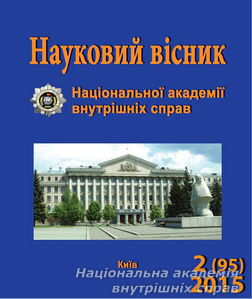Legal aspects of suspect’s and accused locating using telecommunication
Keywords:
search for the suspect and the accused, telecommunication network, mobile phones, Internet network, phone calls
Abstract
The current state of regulatory-legal provision and telecommunication possibilities in determination of the location of the suspect and the accused are analyzed in the article. The contents of convert investigative (detective) actions connected with the intervention into the private life of a person, namely the collection of information from transport telecommunication networks and the determination of the location of radio electronic means are analyzed too. The aim of the article is the research of the legal aspects of the wanted person location determination according to which operative and search and investigative (detective) actions connected with intervention in private life with using telecommunication can be conducted . The author adheres an attitude that at the conditions of absence of the legally secured and documentally confirmed legal connections between a consumer of moved (mobile) services and an operator of the given services the acquisition of information from transport telecommunication network is a direct violation of the Constitutional human and civil rights as to the security of the phone calls. The author analyzes the legal basis of existing law and subordinate regulatory-legal acts of determination of the phones and computers (platforms) location with using telecommunication. In the conclusions the author indicates that there are unregulated legal questions in determination of the location of the suspect and the accused with using telecommunication, which violate the Constitution of Ukraine and the right to security of the phone calls and right to non-interference into the private life.Downloads
Download data is not yet available.
Abstract views: 57 PDF Downloads: 87
How to Cite
[1]
Shapovalenko, E. 1. Legal aspects of suspect’s and accused locating using telecommunication. Scientific Herald of the National Academy of Internal Affairs. 95, 2 (1), 216-223.
Issue
Section
Law enforcement activities
- Authors reserve the right to authorship of their own work and transfer to the magazine the right of the first publication of this work under the terms of the Creative Commons Attribution License, which allows other persons to freely distribute published work with mandatory reference to authors of the original work and the first publication of an article in this magazine.
- Authors have the right to enter into separate additional agreements on non-exclusive dissemination of the work in the form in which it was published in the journal (for example, to post an article in the institution's repository or to publish as part of a monograph), provided that the link to the first publication of the work in this journal is maintained.
- The journal's policy allows and encourages the posting of articles by authors on the Internet (for example, in electronic storehouses of institutions or on personal websites), both before the submission of this manuscript to the editorial office and during its editorial processing, as this contributes to the creation of a productive scientific discussion and positively affects the efficiency and dynamics of citing the published work.




